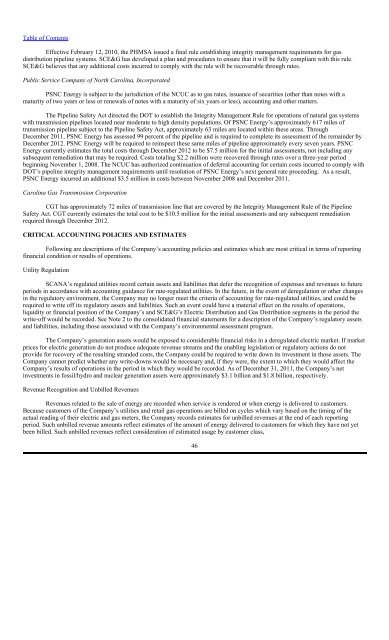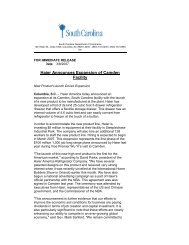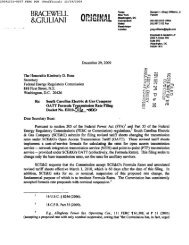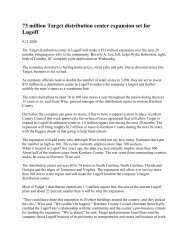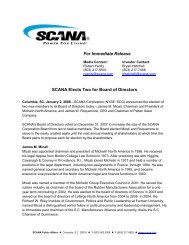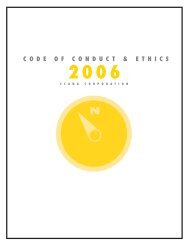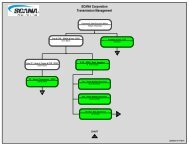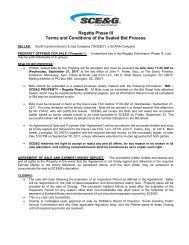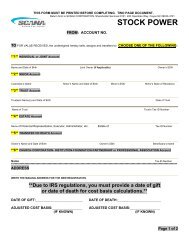10-K - SCANA Corporation
10-K - SCANA Corporation
10-K - SCANA Corporation
Create successful ePaper yourself
Turn your PDF publications into a flip-book with our unique Google optimized e-Paper software.
Table of Contents<br />
Effective February 12, 20<strong>10</strong>, the PHMSA issued a final rule establishing integrity management requirements for gas<br />
distribution pipeline systems. SCE&G has developed a plan and procedures to ensure that it will be fully compliant with this rule.<br />
SCE&G believes that any additional costs incurred to comply with the rule will be recoverable through rates.<br />
Public Service Company of North Carolina, Incorporated<br />
PSNC Energy is subject to the jurisdiction of the NCUC as to gas rates, issuance of securities (other than notes with a<br />
maturity of two years or less or renewals of notes with a maturity of six years or less), accounting and other matters.<br />
The Pipeline Safety Act directed the DOT to establish the Integrity Management Rule for operations of natural gas systems<br />
with transmission pipelines located near moderate to high density populations. Of PSNC Energy’s approximately 617 miles of<br />
transmission pipeline subject to the Pipeline Safety Act, approximately 63 miles are located within these areas. Through<br />
December 2011, PSNC Energy has assessed 99 percent of the pipeline and is required to complete its assessment of the remainder by<br />
December 2012. PSNC Energy will be required to reinspect these same miles of pipeline approximately every seven years. PSNC<br />
Energy currently estimates the total costs through December 2012 to be $7.5 million for the initial assessments, not including any<br />
subsequent remediation that may be required. Costs totaling $2.2 million were recovered through rates over a three-year period<br />
beginning November 1, 2008. The NCUC has authorized continuation of deferral accounting for certain costs incurred to comply with<br />
DOT’s pipeline integrity management requirements until resolution of PSNC Energy’s next general rate proceeding. As a result,<br />
PSNC Energy incurred an additional $3.5 million in costs between November 2008 and December 2011.<br />
Carolina Gas Transmission <strong>Corporation</strong><br />
CGT has approximately 72 miles of transmission line that are covered by the Integrity Management Rule of the Pipeline<br />
Safety Act. CGT currently estimates the total cost to be $<strong>10</strong>.5 million for the initial assessments and any subsequent remediation<br />
required through December 2012.<br />
CRITICAL ACCOUNTING POLICIES AND ESTIMATES<br />
Following are descriptions of the Company’s accounting policies and estimates which are most critical in terms of reporting<br />
financial condition or results of operations.<br />
Utility Regulation<br />
<strong>SCANA</strong>’s regulated utilities record certain assets and liabilities that defer the recognition of expenses and revenues to future<br />
periods in accordance with accounting guidance for rate-regulated utilities. In the future, in the event of deregulation or other changes<br />
in the regulatory environment, the Company may no longer meet the criteria of accounting for rate-regulated utilities, and could be<br />
required to write off its regulatory assets and liabilities. Such an event could have a material effect on the results of operations,<br />
liquidity or financial position of the Company’s and SCE&G’s Electric Distribution and Gas Distribution segments in the period the<br />
write-off would be recorded. See Note 2 to the consolidated financial statements for a description of the Company’s regulatory assets<br />
and liabilities, including those associated with the Company’s environmental assessment program.<br />
The Company’s generation assets would be exposed to considerable financial risks in a deregulated electric market. If market<br />
prices for electric generation do not produce adequate revenue streams and the enabling legislation or regulatory actions do not<br />
provide for recovery of the resulting stranded costs, the Company could be required to write down its investment in those assets. The<br />
Company cannot predict whether any write-downs would be necessary and, if they were, the extent to which they would affect the<br />
Company’s results of operations in the period in which they would be recorded. As of December 31, 2011, the Company’s net<br />
investments in fossil/hydro and nuclear generation assets were approximately $3.1 billion and $1.8 billion, respectively.<br />
Revenue Recognition and Unbilled Revenues<br />
Revenues related to the sale of energy are recorded when service is rendered or when energy is delivered to customers.<br />
Because customers of the Company’s utilities and retail gas operations are billed on cycles which vary based on the timing of the<br />
actual reading of their electric and gas meters, the Company records estimates for unbilled revenues at the end of each reporting<br />
period. Such unbilled revenue amounts reflect estimates of the amount of energy delivered to customers for which they have not yet<br />
been billed. Such unbilled revenues reflect consideration of estimated usage by customer class,<br />
46


